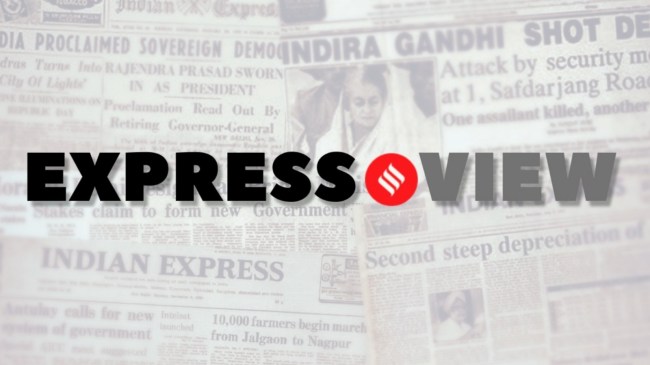Opinion Express View on PM Modi’s Independence Day speech: Hope, not fear
PM’s call for reform and self-reliance struck the right note; the spectre of the ‘intruder’ one of disquiet
 PM Modi reminded the nation of India’s proven “samarthya” or capability — when it took the lead in manufacturing the coronavirus vaccine, not only for itself, but also for the world; and more recently, when, powered by indigenous weapon systems, it conducted Operation Sindoor.
PM Modi reminded the nation of India’s proven “samarthya” or capability — when it took the lead in manufacturing the coronavirus vaccine, not only for itself, but also for the world; and more recently, when, powered by indigenous weapon systems, it conducted Operation Sindoor.
Prime Minister Narendra Modi’s Independence Day speech, his 12th in a row, was delivered against the backdrop of a global economy roiled by unpredictability, turmoil and upheaval. PM Modi did not name him but Donald Trump and the tariff regime the US President has unleashed, lurked, between the lines, as both presence and shadow. For the most part, the PM spoke of how India needs to enliven the “Make in India” and “Vocal for Local” mantras, and install self-reliance at the heart of the country’s development strategy and growth model. The message was: In times when the Trump tariff regime is impacting exports, and when disruptions in global supply chains are threatening to squeeze imports, India must focus on strengthening the domestic economy by pursuing the path of self-sufficiency or “aatmanirbharta”. PM Modi reminded the nation of India’s proven “samarthya” or capability — when it took the lead in manufacturing the coronavirus vaccine, not only for itself, but also for the world; and more recently, when, powered by indigenous weapon systems, it conducted Operation Sindoor.
This is not the first time that PM Modi has spoken of the need to Make in India, or extolled the virtues of aatmanirbharta. But this I-day speech was remarkable for the urgency with which it sought to connect the dots from Atmanirbhar Bharat to Viksit Bharat and national security, framing it as a matter not merely of import-export but as a test of a nation’s very “aatma samman” or self-respect: “Hum nahin banayenge? Hum nirbhar rahenge? (Why will we remain dependent on others)?” He exhorted the young and the entrepreneurs, the scientists and the private sector, to come forward and fill the gaps with ideas and innovations — to make India’s own fertiliser and semiconductor, and to be self-reliant in clean energy and critical minerals. The government, he said, would encourage and enable them through the next generation of reforms, for which he announced a special task force.
But as much as the PM sought to exhort and energise, and even as he tapped into his countrymen and women’s ambitions and optimism — he announced a special Diwali bonanza of GST reform, a Rs 1 lakh crore Rozgar Yojana for the young, invoked the symbolism of naari shakti, space start-ups and Shubhanshu Shukla’s odyssey — he also painted a gathering spectre. Illegal immigrants or “ghuspaithiye”, he said, are snatching Indians’ jobs, taking away land from tribal populations, endangering India’s “behan-beti” or women. His government would, therefore, set up a high powered Demography Mission. While illegal immigration is a resonant issue that is becoming bigger across the world, riding on the back of nationalist politics and populist movements, the PM’s highlighting of it has a disquieting domestic backdrop — of growing incidents of violence against Bengali-speaking migrants in states, and the ongoing controversy over voters’ lists. The BJP’s defeat in the Jharkhand assembly election may have pointed to the limits of “illegal immigration” as an electoral plank, but in a diverse country, it is still an issue that is fraught, one that can propel a politics of distrust and fear. The PM’s playing up of the dark motif of the “ghuspaithiya”, coupled with his tribute to the RSS from the ramparts of Red Fort, showed an unmistakable ideological layering of his message. For the nation, they frame the challenge that lies ahead: Of finding a way forward that sidesteps the fear and embraces the hope.




